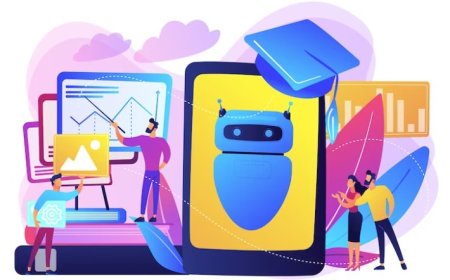Roles of Artificial Intelligence
Discover the transformative power of Artificial Intelligence (AI) and its impact on various industries. Explore the future of AI today!

Artificial Intelligence (AI) has emerged as a transformative technology, offering exciting possibilities for improving various aspects of our lives. While it may sound futuristic and complex, AI is actually more approachable and friendly than ever before. In this blog, we will explore the role of AI in revolutionizing different industries and how it is positively transforming our world, making it more efficient, convenient, and enjoyable for everyone.
Enhancing Healthcare
AI is revolutionizing the healthcare industry, providing valuable support to doctors, researchers, and patients alike. AI-powered systems can analyze vast amounts of medical data, aiding in disease diagnosis, treatment planning, and drug discovery. By harnessing the power of AI, healthcare professionals can make more accurate diagnoses, deliver personalized treatment options, and improve patient care outcomes.
Revolutionizing Education
AI is transforming the way we learn and acquire knowledge. Intelligent tutoring systems powered by AI can adapt to individual learning styles, providing personalized learning experiences for students. AI algorithms can analyze students' performance data, identify areas of improvement, and offer tailored feedback and recommendations. This friendly application of AI ensures that every student receives the attention and guidance they need to succeed.
Simplifying Daily Tasks
Life can often feel like a juggling act with an endless to-do list. Fortunately, Artificial Intelligence (AI) has stepped in to lend a helping hand, simplifying our daily tasks and making our lives more manageable and enjoyable.
AI-powered personal assistants, such as Siri, Alexa, and Google Assistant, have become our friendly companions in navigating the complexities of our daily routines. With just a voice command, these virtual helpers can perform a multitude of tasks, from setting reminders and sending messages to playing our favorite music and controlling smart devices in our homes. Their intuitive and user-friendly interfaces make it easy for us to delegate routine tasks, giving us more time and mental space to focus on the things that truly matter.
One of the ways AI simplifies daily tasks is through automation. AI algorithms can learn our preferences and routines by analyzing our behaviors and patterns. Armed with this knowledge, they can automate repetitive and time-consuming tasks, such as organizing our emails, scheduling appointments, and even managing our finances. With AI handling these mundane tasks, we can reclaim valuable time and energy to invest in activities that bring us joy and fulfillment.
Creating Safer Transportation
AI is playing a crucial role in making transportation safer and more efficient. Autonomous vehicles, powered by AI algorithms, have the potential to reduce accidents by eliminating human errors. AI-enabled traffic management systems optimize traffic flow, minimizing congestion and reducing travel time. These advancements in transportation ensure a safer and more enjoyable commuting experience for everyone.
Enabling Smart Home Automation:
AI has made our homes smarter and more convenient. Through voice commands or smartphone apps, we can control various aspects of our homes, such as lighting, temperature, security systems, and appliances. AI algorithms learn our preferences and daily routines, creating personalized and energy-efficient environments. With AI as our home assistant, we can live in comfort and effortlessly manage our household tasks.
Revolutionizing Customer Service
AI-powered chatbots and virtual assistants have transformed customer service. These friendly bots provide instant support, answer frequently asked questions, and assist with common issues. By automating routine inquiries, AI enhances the speed and efficiency of customer service, ensuring prompt and satisfactory resolutions for customers.
Boosting Business Productivity
AI is empowering businesses to streamline operations and enhance productivity. By automating repetitive tasks, AI frees up time for employees to focus on more strategic and creative endeavors. AI algorithms can analyze vast amounts of data, providing valuable insights for business decision-making and predictive analytics. These advancements help businesses make informed choices and drive growth.
Improving Financial Services
AI is reshaping the financial services industry, benefiting both businesses and customers. AI-powered algorithms can analyze vast amounts of financial data, detect patterns, and provide accurate risk assessments. This enables financial institutions to make informed decisions, offer personalized financial advice, and improve fraud detection measures. With AI, financial services become more efficient, secure, and customer-centric.
Promoting Sustainable Practices
AI is instrumental in promoting sustainability across various industries. By analyzing data related to energy consumption, waste management, and resource utilization, AI algorithms can identify areas for improvement and suggest sustainable practices. AI-powered solutions can optimize energy usage, reduce waste, and help businesses make environmentally conscious decisions, contributing to a greener and more sustainable future.
Facilitating Social Interaction
AI-powered social media platforms and recommendation systems enhance our social interactions online. These algorithms analyze user preferences, behaviors, and interests to provide personalized content and recommendations. AI can help us connect with like-minded individuals, discover new opportunities, and create meaningful relationships, making our digital experiences more engaging and enjoyable.
Supporting Mental Health
AI is playing an increasingly important role in supporting mental health. AI-powered chatbots and virtual assistants can provide emotional support, offer resources for self-help, and guide individuals towards professional help when needed. By leveraging AI's capabilities, mental health services become more accessible, reducing stigma and ensuring that individuals receive timely support and care.
Assisting in Disaster Response
During times of crisis and natural disasters, timely and effective response is crucial in saving lives and minimizing the impact on affected communities. Artificial Intelligence (AI) is playing a significant role in assisting disaster response efforts in a friendly and efficient manner.
AI algorithms are capable of analyzing vast amounts of data from various sources, such as satellite imagery, social media posts, and sensor networks. This analysis provides real-time insights on the extent and impact of a disaster, helping emergency responders and relief organizations make informed decisions.
By analyzing satellite imagery, AI algorithms can quickly assess the damage caused by a disaster, identify areas of immediate concern, and estimate the number of affected individuals. This information helps prioritize rescue and relief efforts, ensuring that resources are allocated where they are most needed.
Advancing Scientific Research
AI accelerates scientific research by analyzing vast amounts of data, aiding in data interpretation, and identifying patterns that might go unnoticed by humans. AI algorithms can assist researchers in fields such as medicine, climate science, and genomics, facilitating breakthroughs and pushing the boundaries of scientific knowledge. With AI, research becomes faster, more accurate, and opens up new possibilities for innovation.
Fostering Accessibility
In today's rapidly evolving world, ensuring accessibility for all individuals is of utmost importance. Artificial Intelligence (AI) is playing a significant role in fostering accessibility and promoting inclusivity. With its friendly and innovative applications, AI is breaking down barriers and empowering individuals with disabilities to fully participate in various aspects of life.
One area where AI is making a tremendous impact is in the field of assistive technologies. Voice recognition technology, powered by AI algorithms, has revolutionized the way individuals with mobility impairments interact with devices. Through simple voice commands, people can control their smartphones, computers, and smart home devices, making technology more accessible and user-friendly. This breakthrough has given individuals the freedom to navigate the digital world independently, opening up a world of possibilities.
AI algorithms are also advancing accessibility for individuals with visual impairments. Through image recognition technology, AI can analyze images and provide detailed descriptions, enabling visually impaired individuals to perceive their surroundings more fully. This empowers them to engage in activities such as browsing the internet, enjoying art, or even experiencing the visual elements of a movie, making the world more inclusive and enriching.
Artificial Intelligence, with its friendly and transformative applications, is revolutionizing our world for the better. From healthcare to education, transportation to smart homes, AI is enhancing various industries and making our lives more efficient, convenient, and enjoyable. As AI continues to evolve, it is crucial to embrace its potential responsibly, ensuring that its benefits are accessible to all while maintaining ethical considerations. With AI as our ally, we can look forward to a brighter and more promising future.




























































